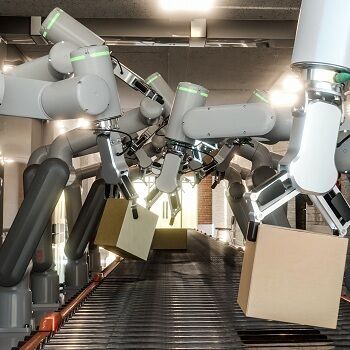Quantum technologies

Quantum phenomena have been known for more than 100 years. Some of them are already in use and often form the basis for modern technology such as microchips, broadband internet or satellite navigation. Innovations based on this are also referred to as "first-generation quantum technologies". Effects such as entanglement and superposition are only now being utilised for specific technological purposes and, as "second-generation quantum technologies", offer the potential for completely new technical solutions. They have developed into a key area of research and economic strategy which, as the basis for high-precision quantum sensors, secure quantum communication or new types of quantum computers, among other things, offer enormous value creation potential for new applications in the economy and small and medium-sized enterprises in the country.
Supercomputer of the new generation
Conventional computers only distinguish between two states when processing information: 0 or 1, also known as binary code. Depending on their number of bits, they often reach their limits despite ever-increasing performance, as performance requirements increase in line with performance. But what if a computer could distinguish any number of mixed states in addition to these two states in binary code? In contrast to the bits of a conventional computer, a quantum bit (qubit) can have any number of superpositions of 1 and 0. In addition, such qubits can be coupled or "entangled" with each other quantum mechanically and can assume a common overall state. These properties make quantum computers a parallel analogue computer that is particularly suitable for special tasks. The possibilities and performance potential offered by the use of quantum computers are enormous. In just a few moments, quantum computers can solve problems that were previously practically unsolvable, but which would take conventional computers much longer to solve. The plan to utilise the great potential of quantum computers is therefore increasingly becoming the focus of companies beyond science.

Quantum computers - Made in Germany and Baden-Württemberg
In order to play a leading role in this paradigm shift and become an international beacon for knowledge and technology in this field, the German government is providing a further two billion euros for industry and science as part of an economic stimulus and future package to promote quantum technology, whereby the players will work hand in hand and expertise from industry and basic research will be pooled. The aim is to develop the necessary technologies for German quantum computers by 2025.
As a technology centre and leading innovation region in Europe, the state of Baden-Württemberg would like to make a decisive contribution to achieving this goal in the future. Among other things, the Ministry of Economic Affairs, Labour and Tourism is funding innovative collaborative research projects on various topics in the field of quantum hardware and software development as part of the Baden-Württemberg Quantum Computing Competence Centre. Research is carried out on and with the "IBM Q System One" quantum computer, which was installed in Ehningen in Baden-Württemberg exclusively for the Fraunhofer-Gesellschaft and its partners. Universities, colleges, research institutes, start-ups and companies of various sizes form the environment of the competence centre in Baden-Württemberg with a cooperative approach.

New possibilities through quantum computing
A quantum computer differs from classical computers in that its computing power does not increase linearly as the number of entangled qubits increases, but exponentially. Accordingly, the utilisation and performance potential also increases if it is possible to set the entanglement states in quantum computers for special tasks in which numerous conditions have to be calculated in a complex mutual interaction. The following application examples provide an insight into this:
Optimisation of process and resource planning in industry
One example of the future use of quantum computers lies in the optimisation of complex production and manufacturing processes as well as logistics systems that have to be updated in real time depending on a large number of boundary conditions. This includes, for example, planning the optimal interaction of individual production processes or even entire production sections through to the optimisation of variable routes and loads in the transport and industrial sector.
Faster and better drug development
Another example can be found in drug development. The development of drugs is a laborious and lengthy process due to their complexity and active ingredient interactions. It can take several years before a drug is authorised. Scientists could use quantum computers to calculate and simulate molecular compositions on the basis of quantum chemical models in order to make more efficient drugs available more quickly.
New materials through more efficient materials research
Quantum computers could also do pioneering work in chemistry and materials research. Even binary supercomputers reach their limits in materials research when it comes to molecular structure calculations and simulations. Thanks to their ability to carry out parallelised computing operations simultaneously, researchers could use quantum computers to investigate considerably more hypotheses on the behaviour of new materials under certain conditions than they have been able to to date. This could, for example, help in the development of more powerful electrode materials in batteries or catalytic converters in fuel cells for electromobility.
Autonomous driving and intelligent traffic control
Integrating autonomous vehicles into a comprehensive mobility concept is a huge challenge, not least because of the enormous amounts of data that will be generated. How can traffic flows be controlled intelligently, taking into account their surroundings, so that the transport infrastructure is optimally utilised? A quantum computer could plan and control traffic better, taking into account variables such as traffic lights, speed limits and traffic volumes.
In order to make Baden-Württemberg a centre of innovation in the field of quantum computing in the future, the state is striving to actively develop the technology in science and industry with its support and funding measures.
Promotion programs
More promotion programsFunding opportunities for measures in the field of quantum technology.
Mit dem Programm sollen vor allem Start-ups in der Frühphase und innovative mittelständische Unternehmen unterstützt werden. Das Programmvolumen beträgt zunächst 75 Millionen Euro für die kommenden drei Jahre. Die Mittel stammen überwiegend von der Kreditanstalt für Wiederaufbau (KfW), einen Teil steuert das Land bei.
Privat Investierende, die Geschäftsanteile an diesen jungen innovativen Unternehmen erwerben, werden gefördert. Der privat Investierende erhält 25 Prozent des Ausgabepreises seiner Anteile als Erwerbszuschuss zurückerstattet.
Ziel dieses Förderprogramms ist die Weiterentwicklung von Ideen aus bereits bestehenden EU-geförderten Projekten. Notwendig ist ein Vorprojekt aus den Förderprogrammen „EIC Pathfinder“, „FET“ oder „ERC Proof of Concept“, in dem die Realisierbarkeit einer bahnbrechenden Technologie im Labor nachgewiesen wurde (Technologiereifegrad 3). Von diesem ausgehend soll die Marktreife erhöht und ein Demonstrator in relevanten Einsatzumgebungen entwickelt werden. Anträge können allein oder in Konsortien aus 2 bis 5 Mitgliedern gestellt werden.
Es gibt themenoffene Aufrufe (Transition Open) und auf bestimmte Herausforderungen fokussierte Aufrufe (Transition Challenges). Hilfe und Hinweise finden Sie in den FAQ der Webseite www.innocheck-bw.de des Unterstützungsprojekts für Start-ups und KMU beim Steinbeis Europa Zentrum, gefördert durch das Ministerium für Wirtschaft, Arbeit und Tourismus Baden-Württemberg. Weiterführende Informationen entnehmen Sie bitte ebenfalls der Webseite des Unterstützungsprojekts.
Calls u.a. www.steinbeis-europa.de/de/leistungen/eu-foerderung


